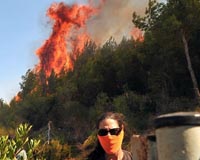| . |  |
. |
Exeter, UK (SPX) Jun 09, 2010 Fire occurrence rates in the Amazon have increased in 59% of areas with reduced deforestation and risks cancelling part of the carbon savings achieved by UN measures to reduce greenhouse gas emissions from deforestation and degradation. New research led by the University of Exeter, published on Friday 4 June, in Science, analysed satellite deforestation and fire data from the Brazilian Amazon to understand the influence of United Nation's REDD (Reducing Emissions from Deforestation and Degradation) policy on fire patterns in Amazonia. The NERC (National Environment Research Council) funded research shows that fire incidences may increase even with a decrease in deforestation rates. Amazonian farmers are prone to keeping agricultural land free of new growth by 'slash and burn' methods, usually on a three to five yearly cycle. The extra carbon emitted by the leakage of fires from farms into surrounding forests edges and forest fragments as well as deforestation of forest regrowth, which are not accounted by the Brazilian's deforestation monitoring system may therefore be partially negating carbon savings achieved through the UN REDD programme. The research suggests that if sustainable fire-free land-management of deforested areas is not adopted in the UN-REDD programme, any carbon savings achieved by avoiding deforestation would be partially offset by increased emissions from fires. The UN-REDD programme is a multi donor trust fund which provides appropriate revenue streams to the right people, making it worth their while to change their forest resources behaviour. The efficiency of the UN-REDD programme as a climate change mitigation strategy depends upon the stabilisation of deforestation and degradation of the world's largest rainforest, the Amazon. Dr Luiz Aragao an Environmental Scientist at the School of Geography, University of Exeter said, 'Changes in fire frequency could jeopardise the benefits achieved through UN-REDD as trends in fires are the opposite to trends in deforestation. However despite UN-REDD's vital importance in this region, fire is currently neglected in the emerging UN framework.' Naturally occurring fires are very rare in the Amazon. Fires are normally caused by humans who farm the land. Burning deforested areas on a three to five year rotational basis improves the nutrients in the soil keeping it fertile and at a level that can produce food. Predications that climate change will create a drier area across the Amazon adds to the concern, as it is a difficult to control the spread of fires in such vast areas. The best option is to stop fires from occurring in the first place. Dr Aragao explained, 'We need to change the way Amazonian people use and manage their land so that they can do this without fire. They would need financial assistance for machinery, training and technical support to enable them to comply with implementation and maintenance of fire-free management of their land.' He added, 'By changing land management practices in already deforested areas to fallow management and introducing more diversified and sustainable agricultural practices at a co-operative community level, it is possible to drastically reduce fires and carbon emissions. It would be expensive but it would protect the stability of Amazonian carbon stocks and diversity.'
Share This Article With Planet Earth
Related Links University of Exeter Forest and Wild Fires - News, Science and Technology
 Quebec forest fires black out skies
Quebec forest fires black out skiesMontreal (AFP) May 31, 2010 Thick smoke billowed from forest fires in Quebec's backcountry on Monday, sparking smog alerts in Montreal and the US city of Boston, and putting city firefighters in Ottawa on alert, officials said. Fifty-two blazes burned north of Montreal, eight of them out of control, blackening thousands of hectares of forests in Quebec, the Quebec forest fire protection unit (Sopfeu) said. In Ottaw ... read more |
|
| The content herein, unless otherwise known to be public domain, are Copyright 1995-2010 - SpaceDaily. AFP and UPI Wire Stories are copyright Agence France-Presse and United Press International. ESA Portal Reports are copyright European Space Agency. All NASA sourced material is public domain. Additional copyrights may apply in whole or part to other bona fide parties. Advertising does not imply endorsement,agreement or approval of any opinions, statements or information provided by SpaceDaily on any Web page published or hosted by SpaceDaily. Privacy Statement |